
One of the most widely ignored types of discrimination occurs to those who served time in state or federal prison on felony charges. The incarceration system is supposed to be about paying your dues to society for your crime and then moving on with your life.
Many former inmates find that life after prison is like being in a permanent time-out from the rest of society. In fact, recidivism rates in the U.S. are over 50% within three years of release from prison.
This is due to the hardship a felony conviction places on a person’s ability to find a job, limitations on where they can afford to live and restrictions against them ever owning a firearm, even if that firearm is a rifle for hunting or another legal activity.
A felony conviction doesn’t necessarily mean the person’s gun rights are lost forever. There are many hoops to jump through to restore gun rights after a felony conviction. Here are 3 important things to keep in mind.
3 Facts About Gun Rights After a Felony
1.Gun Control Act applies to all felony convictions, not just violent ones.
Not all felonies involve violence or injuring another person. In some instances, the “white collar” crime of money laundering can be considered a felony, as well as custodial interference. Originally, the federal government only banned people convicted of a violent felony from owning firearms.
However, the previous law was updated with the Gun Control Act of 1968. This new law amended the restriction from owning guns to just violent felons to anyone ever convicted of a felony, including those that didn’t involve violence.
This law continues to this day. However, more and more states are starting to consider the possibility of allowing people with previous felony convictions to reinstate their right to own guns. As mentioned, felons who wish to get their gun rights reinstated face a lot of hurdles, conditions and government red tape.
2. Restrictions apply to ammunition, too.
Items considered firearms by authorities applies to more than just guns. For example, rockets are also considered firearms. Swords, tasers and knives, however, are legal for convicted felons to own, though some states have restrictions on these items as well.
Many people – convicted felon or not – may be surprised to find out that it’s illegal for felons to own any type of ammunition. This is due to the law stating that felons are unable to purchase guns OR ammunition.
Something as minor as being caught with a bullet, but no gun, can result in another felony conviction, which would definitely end any possibility of ever getting gun rights restored. One condition of the restoration process is the absence of a second felony conviction.
3. Getting your records expunged is more difficult with federal felony convictions.
The best way to get gun rights restored after a felony conviction is by getting your records expunged if you reside in a state that allows it. The difficulty of the process depends greatly on if the conviction was in state court or federal court.
Getting records expunged after state charges is much easier than if the charges are on a federal level. The first step in expunging your record in is filing an application with the U.S. Attorney’s office.
There are many conditions a former felon must meet before their gun rights are restored. Such conditions pertain to employment, public safety, community involvement and whether their record post-felony convictions remains clean.
Local criminal defense lawyers will have more information on the steps to gun rights restoration in your state. Laws regarding restoration of firearms vary from state-to-state. Contact a felony criminal defense lawyer for your specific case.
Another option for restoring firearm rights is by applying for a presidential pardon or a pardon with the governor of your state.
Bottom Line
Returning to ‘normal’ life after a felony conviction – or any conviction – can be frustrating and lonely. As difficult as it may be, separating yourself from former hangouts and former friends can keep you out of another prison bid.